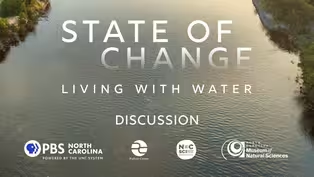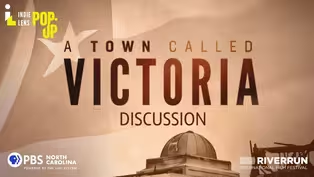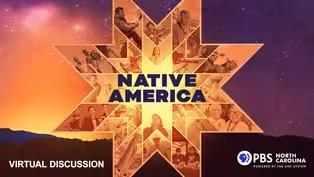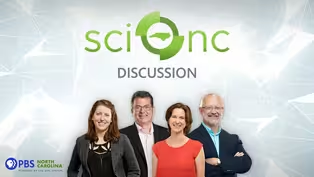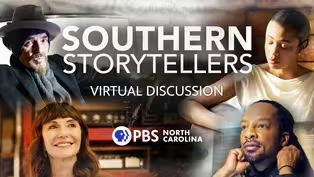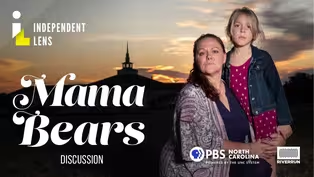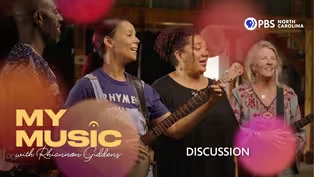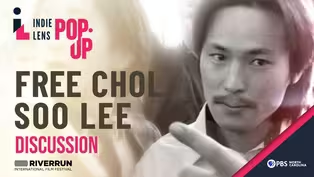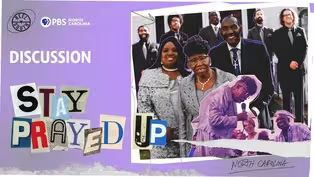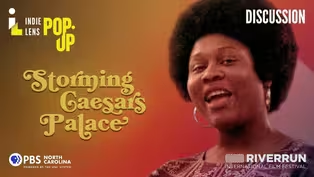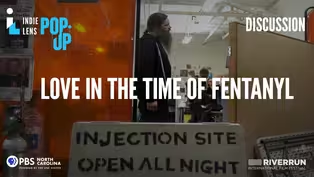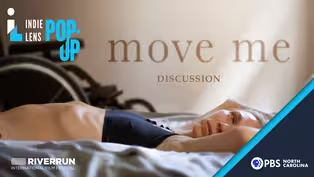PBS North Carolina Specials
Discussion - Fight the Power: How Hip Hop Changed the World
2/1/2023 | 59m 43sVideo has Closed Captions
Local experts discuss the history of hip hop with PBS North Carolina.
PBS NC's Deborah Holt Noel leads a conversation about the history of hip hop: how it became a world-wide phenomenon and the social justice issues highlighted by the artists and their lyrics. Our panelists: Dr. Mark Anthony Neal & Dr. Nikki Lane, professors at Duke University; Ernest Hooker, podcast host and instructor at NC A&T University; and N-Tyce (Amma Allen), a hip hop artist from Greensboro.
Problems playing video? | Closed Captioning Feedback
Problems playing video? | Closed Captioning Feedback
PBS North Carolina Specials is a local public television program presented by PBS NC
PBS North Carolina Specials
Discussion - Fight the Power: How Hip Hop Changed the World
2/1/2023 | 59m 43sVideo has Closed Captions
PBS NC's Deborah Holt Noel leads a conversation about the history of hip hop: how it became a world-wide phenomenon and the social justice issues highlighted by the artists and their lyrics. Our panelists: Dr. Mark Anthony Neal & Dr. Nikki Lane, professors at Duke University; Ernest Hooker, podcast host and instructor at NC A&T University; and N-Tyce (Amma Allen), a hip hop artist from Greensboro.
Problems playing video? | Closed Captioning Feedback
How to Watch PBS North Carolina Specials
PBS North Carolina Specials is available to stream on pbs.org and the free PBS App, available on iPhone, Apple TV, Android TV, Android smartphones, Amazon Fire TV, Amazon Fire Tablet, Roku, Samsung Smart TV, and Vizio.
Providing Support for PBS.org
Learn Moreabout PBS online sponsorshipMore from This Collection
Recordings of previous virtual event discussions.
Discussion - State of Change: Living with Water
Video has Closed Captions
Panelists discuss resilient North Carolinians adapting to climate change. (28m 54s)
Discussion - A Town Called Victoria - Independent Lens
Video has Closed Captions
The filmmaker and former Victoria residents share their story. (46m 51s)
Discussion - Native America Season 2
Video has Closed Captions
Panelists discuss preserving the languages of Native American tribes. (39m 1s)
Video has Closed Captions
Sci NC executive producer and host, Frank Graff, chats about upcoming Season 6 of Sci NC. (26m 6s)
Discussion - Southern Storytellers
Video has Closed Captions
Author David Joy and others discuss storytelling and their new PBS series. (42m 13s)
Discussion - Mama Bears | Independent Lens
Video has Closed Captions
Producer and director Daresha Kyi discusses the film and LGBTQIA+ advocacy. (34m 41s)
Discussion - My Music with Rhiannon Giddens
Video has Closed Captions
Discussing the series with producers Will & Deni McIntyre and country artist Rissi Palmer. (39m 56s)
Discussion - Free Chol Soo Lee | Independent Lens
Video has Closed Captions
Local lawyers, professors and nonprofit leaders discuss wrongful convictions and reentry. (40m 44s)
Discussion - Stay Prayed Up, Reel South
Video has Closed Captions
The filmmakers discuss their journey with Mother Perry and The Branchettes. (45m 4s)
Discussion - Storming Caesars Palace | Independent Lens
Video has Closed Captions
Local professors and nonprofit leaders discuss welfare and the social safety net. (33m 2s)
Discussion - Love in the Time of Fentanyl | Independent Lens
Video has Closed Captions
Local harm reductionists, therapists and others discuss the opioid crisis and more. (55m 44s)
Discussion | Independent Lens: Move Me
Video has Closed Captions
A dancer with blindness and disability advocates discuss adaptable arts programs. (38m 46s)
Providing Support for PBS.org
Learn Moreabout PBS online sponsorship- [Deborah] Welcome, welcome, welcome.
Hi, everyone.
I am Debra Holt Noel on the staff of PBS North Carolina, and I'm the executive producer of Black Issues Forum, as well as the host and contributing producer for North Carolina Weekend.
We are so excited to have you here.
I have just been taken back.
What a great documentary.
I'm just enjoying the music, but right now I just wanna say once again, welcome and we certainly appreciate you, and thank you for joining us for this screening from the four-part docuseries, "Fight The Power: How Hip Hop Changed The World."
Such an important film, and we are delighted to be able to present it and have this conversation with you this evening.
Just a little bit of housekeeping.
I wanna provide a safe space for an open and informative community-driven discussion.
Please be respectful when entering your questions and comments in our chat to the right of your screen.
Everyone has different opinions and everyone has different viewpoints, so we are here to share experiences and get a broader understanding of the international phenomenon of hip hop music and the social justice issues that influence this genre.
Please note that this discussion is being recorded and will be available to view again at your convenience.
So all event attendees will receive the link to the recording and the discussion will be posted on our website in the engagement discussion or in the engagement section.
"Fight The Power" reveals so much, not only about the culture of hip hop, but also about our culture as Americans.
And tonight, we wanna extend the conversation about hip hop as culture, and it's inextricable link to social justice, to Black social justice.
To do that, we have invited an impressive panel of guests.
I wanna introduce them all right now.
Let us welcome Dr. Mark Anthony Neal, professor, hip hop scholar, author, and chair of the Department of African and African-American Studies at Duke University.
He is also a professor there where he offers courses on Black masculinity, popular culture, and digital humanities, including signature courses on the history of hip hop which he co-teaches with Grammy Award-winning producer, 9th Wonder.
Among many, many other things.
I just wanna make sure that we are in good shape.
Dr. Nikki Lane is also with us.
Assistant professor in gender, sexuality, and feminist studies at Duke University.
She's an interdisciplinary scholar who explores the connections between popular culture and critical theories of race, gender, class, and sexuality.
Her first book titled "The Black Queer Work of Ratchet: Race, Gender, Sexuality, and the [Anti]Politics of Respectability" explores the use of the word ratchet in the community of Black queer women in Washington DC.
We also have Ernest Hooker, a professor at North Carolina A&T State University, and co-host of "Hooker and Mac Show" podcast, and "Digging in the Crates: Hip Hop" podcast on YouTube.
And last but certainly not least, we have Amma Allen, AKA N-Tyce, she's a national hip hop recording artist who is also a native of Greensboro, North Carolina.
She signed her first recording deal at the age of 18 and was actually the first rapper from North Carolina to sign with a major record label.
So we've got some history here on this virtual conversation.
Her biggest hit was a release called "Black To The Point," circulated heavily in New York.
She now runs Spotlight Entertainment and her own record label Message Music.
Welcome once again to each of you.
I'm so excited to have all of you guys here on this conversation, and I just wanna ask you, just open up the conversation with you, Dr. Neal.
Tell us a little bit about your relationship with hip hop, and importantly, this piece that we just saw, how did that hit you?
And I want to hear everything you had to say.
- So I was born and raised in the South Bronx.
I lived my first 10 years in the South Bronx, lived in the Bronx of the first 25 years of my life.
I was born the same year of the 1965 Immigration Act.
So what I saw on screen was much of what I'd lived through even as a child.
But my relationship to hip hop really begins with the first time I heard "Rapper's Delight" on the radio which would've been September of 1979.
And my reaction to it is that we were hearing stuff that we had been hearing in the street for four or five years on the radio, right?
And it felt like something had happened, something had shifted in the culture that stuff that we heard in the park, right?
We suddenly could hear on the radio.
- Yeah, most stuff.
I mean, it definitely took me back.
I remember hearing "Rapper's Delight" and that being my introduction to hip hop.
And I just told on myself, we used to love for the bus driver to play the radio.
I was actually in New Jersey at the time on a military installation, and our radio station of choice was WDAS FM, and he would play that in the mornings.
And so I just loved it.
Let me bring you in, Ernest.
Tell me, how did this hit you, your relationship with hip hop?
- My relationship to hip hop, I was born in 1971.
When I saw the movie, the first thing I saw was the "Fight The Power" video, and that resonated with me.
But I also, my dad, we lived overseas in the Philippines, but once we moved back to San Antonio, Texas, that the first thing that brought me into hip hop was the sort of the breaking Beat Street and a Beat Street battle.
That was because I used to break dance back in the '80s or moving on to the '90s, but the '80s and people wore Pumas with fat shoelaces.
But what I learned is that...
I learned from a Hispanic guy named Chuck, and I went over to his house, and he started windmilling on his head, and I said, "Well, how do you do that?"
And he introduced me to the Beat Street battle, and I began to be one of the people who tried to be a part of the crew.
And back then, we had women who are also part of the crew, so when you had the crew, you had people who can pop lock, you had people who can break dance, or you had different flows.
And so I always, as a kid, my grandmother had me listen to James Brown and that's what really resonated with me.
But it brought that memory when you start talking about "Fight The Power" and Chuck D and the S1W, so that's what really brought me into watching this documentary.
- Awesome.
Awesome.
Dr. Lane, what's your kind of first response to this documentary?
The music, the message, all the issues?
- Yeah, I mean, I too think about my introduction to hip hop which happens after this era.
And also my introduction to hip hop is not necessarily rooted in New York.
And so I'm a Black woman, I grew up in the south, and so my introduction to hip hop and how I enter into it to date my own self is that I come to it 1995 The Source Awards when Outkast was emerging, when the hip hop south was emerging.
And so for me, the artists that were those who resonated the most with me tended to be those rappers from the south during the mid to late 1990s.
Those were my intros into hip hop.
And so I have a lot of love for Outkasts, and I have a lot of love for UGK I have a lot of love for Project Pat, Three 6 Mafia.
And so those are the artists to whom I'm introduced when I come to hip hop on my own, because I grew up in R&B, and I grew up in the world of R&B, but when I started to explore hip hop for myself, those were the artists that I was drawn to.
- Thanks.
And how about for you N-Tyce?
How did you get introduced or what's your relationship to hip hop, and what you think of the documentary or the piece you just saw?
Unmute for me.
Alright, there we go.
- Yay.
- Yes.
Yes.
- So the first rap record that I really remember hearing was a song called "Planet Rock."
And I heard it while I was riding in the car with my uncle Darrell.
And I thought it was the coolest thing.
It was like the music, the beat, because I'm from Greensboro, North Carolina, so we didn't have all like the grand master flashes here that were playing at the time.
But what we did have was a radio station at North Carolina A&T State University, WNAA, and there was a DJ locally called MixMaster D, and he had a crew called Hip Hop Posse and had like a mixtape show on that station.
That is how we all got to hear hip hop music and fall in love with it.
So that was kind of our foundation, hip hop posse.
- Got you.
Got you.
[chuckles] Well, I was really struck by the way that this piece started opening with Killer Mike at the mic speaking on an incident that is not too far removed from us right now.
But even right in this moment, many people are grieving over a very similar incident, of course, many will know and are would remember that Tyre Nichols in Memphis was recently killed by police officers.
And so much of hip hop and the music of the youth, of the working class, as one of the interviewees said in the documentary, "It's about protest and social justice."
Let me go back to you, Mark.
Why do you think that this speech by Killer Mike is the first thing that we see in this piece, in this documentary series?
- You know, so it's a documentary called "Fight The Power," and of course it is largely executive produced by Chuck D, so in many ways, this is Chuck D's view of what hip hop is as a political force.
And Killer Mike is part of a lineage of political rappers, conscious rappers, if you will, that's in direct connection to Chuck D, and the time that they spend in the first part of this talking about the message, Chuck D is a child of the message.
As killer Mike has responded to this particular crisis, the thing that creates the moment, that makes public enemies so important in New York City in particular, you have the killing by the police of graffiti artists.
Michael Stewart in 1983, you have Bernard Goetz shooting for Black kids on a subway train in 1984.
In 1985, Eleanor Bumpurs, an elderly Black woman is killed by police.
Michael Griffith is chased by a mob in 1986.
It was just on and on, right?
So it was all these kinds of crisis that resonated largely in New York because we didn't have a large kind of media infrastructure at the time.
But hip hop was a response to these ongoing summer crisis that really come into their head in 1989 with the song "Fight The Power" and the Spike Lee film "Do The Right Thing" which really introduced its tension to a larger population.
- Yes.
And N-Tyce, your hit "Black To The Point" and a lot of your other work, also just speaks to some of the things that you experienced, that the people experienced, and needed this music to be an outlet.
Can you talk a little bit about how it served as an outlet for you in your music then, and even up to current day.
- So my first record, it wasn't like my biggest hit "Black To The Point," but it was my first single that came out.
And back then, it came out in 1990, and hip hop was very conscious, like you say you have the Public Enemies, and X Clan, and it was just very promoting our type of culture.
And I wrote "Black To The Point" just 'cause I was only like 18 years old, just fresh outta high school and going to college, and I was just really tired of seeing Black on Black crime, and then just gun violence was huge.
And it's weird because we're still experiencing the same things today that we were then, and that they even speak about when this all originated as far as hiphop, but- - I think it's interesting that you wrote about this, but one of the things that hip hop gets associated with is not just working class, but a poor class and urban street culture.
But you didn't necessarily grow up with that as part of your culture.
Can you talk about how a lot of the messages who, that are coming out of hip hop music still speak to your experience and who you are?
- Yeah, I mean, I was fortunate and blessed.
I mean, I come from a really good family, and being in a college student that young.
But I sadly experienced police brutality in my early 20s being a young black girl driving a convertible BMW at UNCG, I find myself in the back of a police car being totally harassed by an officer for nothing.
I mean, my thing is if someone breaks the law, give them a ticket, let that happen, but for the brutality and that sort of thing for it to happen to me was just sad.
And just to see it...
I have a son, and just to know that Tyre Nichols or George Floyd, and the things that happened to them in today's world, it's just unbelievable.
- Yeah, you're right, you're absolutely right.
And did one of you wanted to hop in?
Dr. Lane?
- Sure, I can chime in briefly just to say that I think one of the things that I see as really interesting during this particular time period, the '70s, the early '70s and the '80s is that they're coming off of the back of a lot of consciousness raising that Black folks have undergone for the past 20 years.
So the rappers who are emerging during that time had a particular kind of black consciousness that I don't necessarily know is that you could say is replicated in the contemporary era.
I mean, the kind of political cultural figures that we had in the '60s and '70s, there's ne not necessarily the same kind of individuals, the same kind of political breadth of movement and not the same kind of energy around kind of a shared sense of blackness in this country.
Which I think makes a difference in the kind of hip hop that you get.
And I think it makes a big difference in the kinds of messages that emerge from hip hop.
I also think hip hop is different in that it is one of the most commercially viable music forms in the world right now, which wasn't necessarily the case in the '70s and '80s.
I mean, it was emerging, but it hadn't yet taken over the globe.
And so I think that there's also a kind of commercial and commercialized financial incentive for the kinds of music that we hear today.
So I think it's just gonna be different in terms of what the kind of content of our hip hop or what our hip hop can do in this contemporary era, at least the kind of commercially mainstream versions of hip hop that we get.
I don't think that's all of hip hop.
And I would hate to make it seem like that is the only kind of hip hop that is in existence.
I don't believe that to be true.
But I think there's something to be said about the context in which some of our earliest hip hop artists are emerging.
I think they're inundated with a set of political ideologies or ways of being in the world that are very different than those of folks who are emerging in the early 2000s, right?
Like 20 years after them.
There's a different kind of political climate that they're working in.
- Hmm, well, let me bring you in here, Ernest, because I think sometimes it's easy for people who grew up during my generation when hip hop was just emerging to be critical of what it's evolved into.
But how has it taken shape based on what you have seen?
I mean, you explore the genre from its beginnings and you appreciate the entire length of it, and you also get the opportunity to work with a lot of students, and you're on a college campus.
What are they saying about hip hop today and how they feel about it versus maybe some of this criticism that comes out about it not really being on message anymore?
- I think just to concur with what Dr. Lane was saying, like the periods of the '70s, you have disco, you have certain kind of music, but then when you get to the '90s, I know for me, when my dad retired from the Air Force and we moved back to Los Angeles, California, that's why I got exposed to groups like AWA, Dr. Dre, and so I was there when Rodney King got beat by those officers.
And so the message out in California in the '90s, yes, it was commercial.
I would say that when they came out with the song, talking about the police, it wasn't that they were responding to police brutality.
And if you look at someone like, I'll take someone like Ice Cube for example, when he split with NWA it wasn't because of he had disagreement with NWA, it was mainly because of the commercialization of hip hop.
And so with that being said, when Ice Cube begins to break away from NWA and the same producers who produced with Republic Enemy, the Boom Squad, you see him talking about the police, you see him calling out different individuals talking about the contradictions of the capitalist part of hip hop and then the conscious part of hip hop which was great.
But on college campuses now, today when the first thing I did, I showed the "Fight The Power" video to students, and they had no idea of the level of consciousness, but what they saw is college students and Chuck D and Flavor Flav.
And I said, now Flavor Flav, he don't get a lot of credit.
yeah, he was the hype man but he was consciously aware.
And I think what you get is that hip hop had cultivated in different era, just like Dr. Lane mentioned Outkast.
Now, when Outkast came out, it wasn't that they weren't so much conscious, it was different type of music.
You know, UGK, the list goes oo and on, Project Pat, 8Ball & MJG, and then you have, of course if you got the Sisters, you talking about Queen Latifah, Monie Love.
And I think what's missing in hip hop, it's not missing, it's just that understand that hip hop has many, many facets and many layers to it when you think about the music.
I mean, again, these groups just are magnifying and I think that we have to listen to the message 'cause what I often do is...
There's this new artist, I'm done some research called Skyzoo, he has a song called "Panthers & Powder," and he's highlighting about the police brutality.
He's also talking about how the Black Panthers were thriving at a time where speaking out about the injustices.
So I think with college students, if we talk with them and get them to understand how music hip hop has the influence, I think, you begin to start there to not just listen to hip hop, but just understanding these messages, especially, if it's conscious.
- And I dare say, they were singing about more than about the police, but what they wanted to do to the police.
[chuckles] - Yes.
- And Mark, can I get you any on this, to add even more of understanding in that '90s era, we still had the violence, we still had the injustice, but now it sounds like capitalism is coming into play and perhaps politics in a different way.
Can you help us understand the evolution from... Because I remember listening to some of the lyrics, even of the message, and I was like, "I'm enjoying this music, I'm dancing, I'm loving it.
And I haven't heard the F word, the N word, the B word once," and I loved it.
- It's only a couple of things, right?
I think if you take hip hop that's produced from 1987 to 1992, you'll get the most diverse period of the kinds of rap music and the kind of artists that were promoted.
When the early '90s comes and the ability to do different kinds of production... We could say a lot of things about NWA, and gangster rap, but Dr. Dre changed the sound of rap music, and inevitably changed the sound of what we understand as pop music now.
And so when you get to that critical point in '90, '91, and you have a public enemy, you have Ice Cube, you have Ice-T, right?
You have women like Queen Latifah, right?
You have groups like Poor Righteous Teachers, Brand Nubian doing a kind of Five Percenter thing, it's a really great moment.
And what happens is almost purely incidental, sound scan gets introduced as a new technology.
Before then, record sales and things like that, that were reported by record stores, young folks don't know anything about a record store anymore, right?
Because they don't exist anymore, right?
And they got also reports from DJs and radio stations.
Sound scan was the first technology, basically, to identify every sale from the point of sale, right?
Largely in large malls and things like that.
And lo and behold, what they found out that a bunch of white kids liked rap music.
So NWAs, and I can't say the title of it, but Efil4zaggin, y'all know what I'm talking about 'cause it was spelled backwards on the album.
This is an album gangsta rap, they didn't have any radio play, they didn't shoot any music videos, and it goes to number one on the pop music charts two weeks after release.
And that was kind of a red flag, right?
And all of the corporate entities got involved because this great moment of hip hop is largely a moment of hip hop that's framed by independent labels.
Def Jam is an independent label, right?
As one example of that, yeah.
- So why do you think it resonated so strongly with white audiences too?
- I think white- - They weren't being oppressed where they am so- - I think there are a couple of things.
I think white kids, and this is a historical thing, right?
This is Norman Mailer writing about "The White Negro."
There have always been young whites who wanted to live vicariously in the bodies of Black folks.
So whether that's white beats listening to jazz music in the '50s and the '60s or white kids in the suburbs, and middle America listening to hip hop in the '80s and the '90s, that's how that played out.
I also think there is some disaffected young white folks who heard something political in the movie, in the music, right?
When you think about a song like "Cop Killer" by Ice-T, and rap gets a bad rep for this, right?
This is a rap song called "Cop Killer," it is not a rap song, it is a thrash metal recording.
The reason why "Cop Killer" by Ice-T was dangerous because that same critique of police brutality also resonated for poor white kids, right?
That's why it had become dangerous, 'cause it's not like there hadn't been any anti-police songs directed at Black kids that had existed before, whether we're talking about NWA.
The same summer that "Cop Killer" comes out, Snoop breaks through with the deep cover soundtrack, right?
And the chorus is, it's 1 887 MF Cop.
No one said anything about that, but when Ice-T does a song that white kids are now hearing and getting political, that's when it really became dangerous.
- And also just to add to Dr. Neal, Ice-T came out with "6:00 in the morning police knocking at my door."
And that resonated but speaks to what Dr. Neal saying about how it reached whites as well.
And so when you look at Dr. Dre as well, he changed the Grupo Frontera and then "Deep cover."
Those were music that fit the movies at the time period, and then when you get the Boyz n the Hood, it just takes off.
And so what you see now, my last point is that from the time period of... Mark Anthony Neal was talking about, he's correct in that regards, if you look at the diversity in music, but once you move to the 2000, it just changes its phase.
- Wow.
I wanna kinda shift us to talk a little bit about a group that wasn't addressed in this particular clip.
I'm sure that it's gonna come out in some of the other additions of this entire four-part series, but that's women in hip hop, that's the treatment of women sexuality.
Dr. Lane kinda sticking with what young people are feeling.
You write about racializing sexuality and gender.
And in one of your publications, you wrote about a gendered Black body that enjoys privilege in hip hop.
Can you share a little bit more about what you meant by that?
- Yeah, so the essay you're talking about is one where I look at Missy Elliot, and I think about her contribution to hip hop.
And one of the things that I say is that, one of the things that Missy does is she...
I mean, I'm of the mind that Missy also does something in 1997 that radically shifts the way hip hop will look after that, which is a kind of infusion of what we understand R&B to be and it becomes almost synonymous with the kind of hip hop rap, like you can do both at the same time.
And I think Missy is really instrumental in that.
But one of the things that Missy also does is she becomes one of the most popular hip hop artists of that era.
And she does so making sure that the voices of women are heard in hip hop in a way that that had been done in some ways, but it became one of the most popular ways of doing it, right?
And I think that that's really interesting to think about because prior to that, usually when we think about the mic, even if you look at the section of the documentary that we saw, the only people who were holding microphones were men, and yet we know that men were not the only people who were rocking parties.
We also know that men weren't the only people doing hip hop during this time.
We are sitting on a call with actual hiphop artist who is not a man, right?
And so I think that in some ways there's a way that hiphop creation stories oftentimes leave out the women, even when they're talking about, like the story of Kool Herc, right?
How he comes to the parks about this party, right?
Who made that happen?
It was his sister, right?
Women have been a part of hip hop for a very long time, but our contributions are often not quite treated in the same way that men's contributions are treated in hip hop.
So I told you about coming to hip hop vis-à-vis like the '90s, but that also means I came to hip hop via Salt-N-Pepa, that also means that I come to hip hop via a Queen Latifah, that also means that I come to hip hop with Lil Kim, right?
And so there are women who are instrumental in shifting and changing the way that you can talk about yourself in hiphop, because typically hiphop privileges Black heterosexual men.
And so you can think about the way that Black women often have to enter into hiphop through a different kind of way, right?
Because typically women are not speaking subjects in hiphop.
They are talked about if they're discussed, but they are not the actual person speaking.
And so something starts to shift, I think, when Missy grabs the mic.
And I think when other women like Eve, Lil Kim grab the mic, they do something else and give us new narratives, new ways of talking about self.
So I'm really excited to see the burgeoning of Black women in hip hop right now that we're experiencing.
I really love to see it because I think that we're starting to see the work that was put in a decade and a half ago.
- N-Tyce, what do you think about the burgeoning of women in hip hop today?
- Really happy.
There's so many female rappers that are out now, which really wasn't that common in the early '90s.
I mean, you did have Queen Latifah, Salt-N-Pepa, MC Lyte, Monie Love.
I mean, you had all of these female rappers, but they were like always competing with each other and people would compare 'em.
I guess they kind of do that now, but it's just, on the radio, it's like women are really dominating.
And I'm very proud of that because it's taken since the '90s to now to even have them dominating.
And not just that, but earning the money that they deserve from being a cool artist.
It's all happening now and I just love it.
- Well, I wonder about the judgment that exists out there, about what they're singing about, how they sing, how they own, who they are, and their definition of empowerment.
You think about Megan Thee Stallion, Nicki Minaj, Lil Kim.
I mean, what I see is sexualization and a lot of lyric that speaks to sex, but... Is that what it is?
What are they doing with their lyric and with their art that is indeed empowering and can allow us to kind of take the judgment glasses off?
Dr. Lane, let's start with you.
- Well, I'll just say briefly, I don't think that's all they're talking about.
And I think that's a mischaracterization, and I think it's based on the fact that people very rarely listen to women.
You know what I mean?
They just don't listen.
I mean, it's like Megan Thee Stallion walks in the room and before she even says anything, we assume that she's a certain kind of person in the world.
We don't actually listen to the album, we just listen to the like sexy songs that we want to listen to, but we don't hear the song where she's actually talking about her trauma and the effects of having to live through a particular traumatic experience in her life and having no one around.
We don't listen to the song where she's talking about how hard it is to have lost her mother.
We don't listen to those songs, so we don't think about them, we don't experience them as ones that are also integral and vital to an artist.
I just listened to GloRilla album, I love it, I think it's fantastic.
And the idea that she would only talk about one particular thing is kind of obscene.
It's like you really don't wanna listen to them, you just want to...
I think some of it is in some ways related to the commercialization, right?
So what happens is the stuff that sells the most is the stuff that entices people the most.
But that isn't necessarily what you're gonna hear if you listen to a artist's record from top to bottom, they have all types of music in there that are usually way more complex and that tell 'em more interesting story than if you only listen to one song.
But I also think it's interesting that people are very uncomfortable, are made uncomfortable by women talking about sexuality in general.
So I think that that's also par for the course.
If a woman talks about her sexuality, especially a Black woman in public, we are always up our meters, our spider senses are tingling 'cause it makes us feel uncomfortable.
But the truth is, is that talking about sex or talking about one sexuality, there's nothing wrong with it, it's a natural normal part of one's experience in the world, but it upsets people, but I don't necessarily- - On who gets to talk about it.
- Yeah, it upsets people.
- I think what's important about what Nikki just said about how we think about Black women rappers and sexuality, women rappers and sexuality, it's that same kind of lens that has colored our sense of what hip hop is, is if they only talk about violence and drugs, right?
And they're not talking about more complex stories.
And I think in the case, to the extent where Black women rappers actually talk about sex and sexuality, there is a difference between being objectified as a sexual subject, as a subject object, and an object of desire, and doing that from a physician to subjectivity, right?
Where you're controlling the narrative of your sexuality as opposed to a male rapper and posing that on you in their raps.
- Yeah.
- That early on, like, female rappers actually wrote their own material, so we were conscious rappers, we were able to say ladies first and that sort of thing.
And nowadays, I think that a lot of the influence where it switched was kinda like what Biggie and Lil Kim, and him writing those lyrics, and then Biggie's writing in the sense of giving the guys what they wanna hear through the perspective of a female word.
- And then also, I remember, I listened to a lot of Bahamadia and Guru just because of the jazz samples and DJ Premier.
And so I was maybe about couple months ago, I was in Aaron McKay's and I found a Bahamadia CD and if you listen to it and you look at the...
If you just look at the album, it's Black queen, the music is good and you can see, okay, that's a DJ premier, but she also wrote the samples as well.
And so it's just like, when I met N-Tyce, met her through other people, but then when I began to listen to her music, I was taken over by the lyrics.
But if you don't know, just the commercialization of the sexualization of women, that's just what people wanna see, but when you look at their lyrics, I think that's the piece that has to be put out there.
I mean, when I seen the Popeye's commercial with Nicki, I mean, with Megan Thee Stallion, I mean, that doesn't mean that that's her, but that's the commercialization of hip hop again.
- Yes, definitely.
This is great conversation.
I wanna invite the folks that are listening in and being a part of this.
If you have a question, drop it in the chat, and we'll try to get it into one of our panelists.
We'd love to hear from you, get your comments, get your questions as well.
Let's talk a little bit about the politics and policies that create the conditions that kinda feed also hip hop culture.
And one of the elements is Black political leaders.
Let me start with you, Mark.
Do you see that today's black political leaders have any role or impact or influence on hip hop today?
- I think it's very different.
I mean, this is a point that Nikki made earlier.
And the film I think, spends a good amount of time, thinking about the quality of Black political and spiritual leadership.
In the early 1970s were really different, right?
It fed a generation of young folks, and to the extent that we see that bubble up in hip hop, even in the late '80s and in '90s, it is because of the generation of hip hopers who came before them that were influenced by these folks.
We can look at a figure like Minister Louis Farrakhan, who probably doesn't resonate at all for young rappers, but there was a period of time, a good 15-year period, right?
Whenever there was beef in hip hop, he was the one who had the power to be able to bring two sides together, right?
Famously brought Common and Ice Cube together at a point in their career where they were beefing with each other in a sort of weird bicoastal way.
I don't think they listened to political leaders that same way.
I don't see the same kind of grassroots leadership that resonated in that way.
And that's, again, to Nikki's earlier point, the sense of what Black community is, and the sense of a shared fate is really different.
And what's been now articulated as power is largely economic and folks tend to look at those folks who are most visible in terms of their wealth accumulation, right?
And I'm not just talking about Jay-Z and Beyonce, but there are generations of folks now who are very visible in hip hop, largely because of their economic power.
And some of that's translated to do good things within the Black community, but it's not reproducible in a way that's going to impact the majority of young Black folks.
- Thanks.
Let me get your thoughts on that N-Tyce.
- As far as?
- Yeah, as far as those who... What role, if any, do you think Black political leaders have on hip hop culture today, at influence with young people today?
Because I mean, when I look at a lot of the symbols that are used in the culture, you see the Malcolm X, even Martin Luther King, Marcus Garvey, in the documentary they referenced Jesse Jackson, and even those leaders were kind of keyed into the culture.
So I just wanted to know what your thoughts were about that.
- I was watching an interview yesterday, I think it was yesterday, with Hillary Clinton's daughter, and she was talking about how when Hillary met Megan Thee stallion, and how did that feel?
But she was talking about her mom was like, she believes in her having her freedom of expression, which is awesome because it's almost like the first amendment can appeal to some people but not everyone.
But when we are able to express ourselves, we should be able to do so freely.
Back in the days though, there was a lot of censorship with hip hop music too, that created a lot of issues, I mean, even to the Senate floor, the House floor people were trying to censor music, but I'm not certain, well, I am certain, but it's kind of weird how the first amendment everyone has freedom of speech, but then again, it can be censored.
- Oh, you got a point on that.
- Yeah.
[laughs] - You got a point on that.
All these, "Oh, we can't have these lyrics.
This is creating a problem, this is creating the violence."
That kind of thing.
- But I also saw where I was watching, there was a CNN documentary on Dion Ward, and she talked about having...
When she heard NWA and Dr. Dre and Snoop Dogg using the B word, she invited them to her house one morning and she looked at Snoop Dogg and she said, "Now call me a B."
[all laughing] "Call me a B word."
And he couldn't do it, but that was an eye opener.
You know what I mean?
Now, he has a thought.
- Yeah, you mentioned- You mentioned censorship, and I think about Billie Holiday and Nina Simone, and so many are, I mean, it goes beyond hip hop.
It depends on who's talking as to who has to mind what they're saying.
It really does.
- Yeah.
- As I see it.
Let me ask you all.
You mentioned, speaking of Nina Simone, I wanted to ask you in particular and I mean all of you.
What we're seeing in the foundation of hip hop is a lot of northeast urban street culture and that kind of thing, but can you talk about how this music hit in the south and in the deep south, particularly areas like Raleigh, Durham, Greensboro.
I'm gonna throw it to you, Ernest, to open up with us or open up with that about North Carolina artists and influence on the hip hop culture.
- Well, being that I grew up in the West Coast and traveled, when I moved here to Greensboro around 2005, that's where I started learning about artists like N-Tyce, Jay Gunn, 9th Wonder, Little Brother who his mom works at the A&T and I didn't even know.
And when she...
I was interning at the Dudley Gallery, and she said, "Ernest, come here.
I want you to listen to some music by my son."
And so when I started listening to the minstrel show, and I didn't realize how much artists impact Greensboro had.
Now, going back to what Dr. Neal saying about Jay-Z, I didn't know that Jay-Z came here.
Early on, he got influenced by Ski Beatz and stuff like that, so for me, not growing up here, there's so many artists here, and even on the underground scene, like a lot of younger artists with me working with my interns, they have...
I've been able to discover artists that I wouldn't even pay attention like Reuben Vincent.
And again, one of my favorite artists besides N-Tyce is Rapsody because of the complexion.
I mean, that just opened my eyes, and I finally realized, I said, "Well, look, I need to tap into people here, in the Raleigh Durham area.
And what I would like to see is more collaboration between artists in this area."
And that's one of the things we try to do with the podcast is that traditional radio, you go in, they talk to you for about three or four minutes, and they play more of your music which is fine, but at our podcast, we're trying to actually talk to the artists.
I literally break down, I had a artist last year, he's right around here from Greensboro, so I took about a hour just breaking down his lyrics.
And so when he came to the show, that's never been done before 'cause I want to know what the message is, and I think that that's very important.
So to wrap up my point is that I'm still trying to lift up the blinders here in North Carolina to find out where these artists are.
- That's important work.
- I think something that Ernest points to that's important in terms of the shift to hip hop is really about radio.
You know, 30 years ago, radio was still local, right?
So if you were local artists, you could be heard on local radio stations, right?
Once local radio stations disappeared, everything became national, right?
So you were more likely to hear an artist outside of North Carolina than you were ever going to hear Little Brother or Rapsody or N-Tyce, right?
To the extent that you hear J. Cole is because he went out and got a national reputation and in some ways gets re-imported back into the south, not as a southern artist but as a national artist who's connected to Jay-Z and all these kinds of things.
- Yeah.
Yeah.
That's interesting point.
N-Tyce, did you wanna share anything about local artists and influence on hip hop?
- There's a lot of good local artists.
I think that, back in the day, in the late '80s, early '90s, Payroll Records was like the foundation of the hip hop in this area.
We had Fanatic and Eli and Ski and me and, not one, it was just a lot of artists collectively.
And we actually all ended up going out getting major record deals, which was cool that just let us know the talent we had.
But the thing is, it's just like Mark said, "We had to go there to New York to bring it here."
And I think that we could have been that Atlanta, what Jermaine Dupri did to that area, if people here had stuck together and not had to go other places for their fame.
And radio stations, they have to support their own.
They do a little more better, they do better now, and they've always supported me, I'm grateful for that, but I think that there's so much talent here and if we collectively just brought it all together, we could just do so much more.
There's power in numbers.
- Oh, that leads to something I want each of you to address before we get some audience questions in here.
As a culture, do you think that hip hop, obviously those of you who are professors, needs to be studied as a culture, not just in college, but K-12?
Mark?
- I think it's important as a teaching tool for a couple of reasons, right?
I think we need to know from an intellectual standpoint, from a knowledge standpoint, how important this subculture has been that has been such an important part of American youth culture now for 50 years, right?
We're celebrating 50 years of hip hop this year.
It's not just about its impact on Black and Latino kids, right?
It's for American kids and collected globally.
The second thing is, one of the reasons why I've been invested in this idea of hiphop studies is because hiphop is also a portal to talk about the larger world.
The same way sociology is a portal, the same way that psychology is a portal, the same way that gender, sexuality, feminist studies is a portal, hip hop is a portal and particularly one that's driven by the sensibilities of young folks in the country broadly, but young Black kids in particular.
- Dr. Lane, how do you incorporate hip hop in your teaching, and how important do you think it is to teach it as a culture even in the K-12?
- Yeah, I agree with Mark.
I mean, I think teaching hip hop allows me to stay in the contemporary moment with my students in real time.
I taught a class this fall called Hot Girl Meg, and we were able to talk about Black women and popular culture, we're able to talk about Black women in the United States, we're talking about hip hop obviously, but we're able to do that through the music of Black women in hip hops.
And I think that that's one of the really interesting things about hip hop is that it offers you because of its sensibility, because of its sampling, because of its projects that are embedded in pulling from the things that have come before.
I get to talk about other things that happened prior to 1979 because I'm able to talk about hip hop.
And able to offer students a longer view of popular culture, but of Black life in the United States, which at least in 70, like what we learn about the Bronx and what we know about the Bronx, this is a multicultural space, it is not.
I mean, we can think of hip hop, and we should as a Black musical form, but it's a Black musical form because it is multicultural.
It is Jamaican immigrants, it is Cuban immigrants, it is Puerto Ricans, it is Black folks of all shapes and sizes who are making this music.
And so you get a chance to also deal in the diaspora.
Hip hop is incredibly rich and an incredibly rich site to teach so many things.
And I think that it belongs anywhere you're teaching young people, especially when it is an ongoing music form that is rapidly shifting and changing, that's 50 years old.
If I learned about jazz in school and then we should be learning about hip hop in school.
There's just no reason not to.
- Well, in these last few minutes we have quite a few questions, so I'm gonna try to direct them and get your thoughts on this.
"Dr. Lane, do you see any intersection between hip hop and the LGBTQ+ Black and Latino drag ball house cultures as far as dealing with both external and internalized pressure on who or what you were supposed to be?"
- Yes, that is a good question, and I could take five minutes to answer it, but I'll just say briefly that I think the kind of emerging popularized versions of kind of like ball and house culture it seems to have a similar trajectory of hip hop, right?
There's kind of a commercialization of this subcultural form, and so you will see people doing things that perhaps they might not have done if it stayed a subcultural form.
So I think that that's some of the ways that you see it related.
But I also think you see a large influence of hip hop in the scene itself, right?
So the music is starting to shift and you start to hear more hip hop influences in kind of ball and drag ball scenes.
I think ball and drag are very different.
I wouldn't put them together necessarily, but I do think that there are ways that Black, especially Black LGBT folk have always been a part of hip hop and we see their voices emerging in the contemporary moment alongside of women's voices.
And I'm very excited to see what happens in the next 10 years.
- Thank you.
Mark, let me get your feedback on this one.
"How do you feel that hip hop played a role in all genres of music, streetwear, culture, and influence among the young?"
- You know, hip hop taught swag, so popular music.
The same way that rock and roll did it in the 1960s, hip hop was really ground zero for rethinking of style in all kinds of ways, right?
Do you think about the number of television commercials now that you watched that have some sort of hip hop sound or some sort of hip hop look, you think about the way that Black vernacular language has become part of the larger, broader sensibility.
15 years ago, all the white women who are walking around, giving people the hand, right?
Which came directly out of kinda Black vernacular culture.
I think it's had a tremendous impact in that regard.
And folks, the corporations realized at some point that they didn't have to do that in white face, right?
That actual Black people could help sell the culture in a way that 30 years earlier you would've had to have a white person kind of be a stand-in for that.
- Right.
Ernest, this question's for you.
And I might, if you all are interested to respond as well.
"How do you feel about the use of the N word in hip hop songs today?"
- I think it's very derogatory, not that it's been used before, but I think the way it's being used and being flaunted around, it doesn't necessarily carry the message.
And so many people used the N word for different reasons, but it depends on the artist and the art form.
Of course, if you go back to NWA, there was a purpose for it, but it depends on the artist, what position they taking in on the type of music that the any type of message that you're trying to portray.
- Thank you very much.
Well, this has been a great conversation, I think, and I just wanna thank all four of you once again.
Dr. Mark Anthony Neal, Ernest Hooker, Dr. Nikki Lane, and N-Tyce, really appreciate all four of you coming out and making the time to extend the conversation and to be respectful of everyone's time.
We are officially out of time for this evening.
Many thanks to our special guests once again for sharing their time and expertise with us.
And thank you for logging on and participating in the conversation.
You can watch the rest of the four-part series, "Fight The Power: How Hip Hop Changed The World."
In two weeks, episode two airs on Tuesday, February 14th at 9:00 PM.
And episodes three and four air back to back at 9:00 and 10:00 PM on Tuesday, February 21st on PBS NC your local PBS station.
And stream anytime online and on the free PBS video app after each episode airs.
To share your thoughts and comments with us and the filmmakers, please click on the link in the chat to your right to complete an audience survey.
You'll be eligible to win a $25 Amazon gift card if you provide a valid email address for us to contact you.
Please be on the lookout in your inbox for an email early next week, with the names, organizations, and websites of tonight's panelists, and then when and how to watch the entire series, and a link to this discussion.
The survey link will also be included in the email.
You can see me Thursdays at 9:00 PM on North Carolina Weekend.
And I invite you to watch Black Issues Forum with host Kenia Thompson Fridays at 7:00 PM.
To ensure PBS North Carolina continues to bring you popular PBS shows, riveting documentaries, informative how-to programs, fun lifestyle shows, Rudal or 24-hour kids channel, and free informative screenings like this one, I hope that you are inspired to make a tax deductible contribution to PBS North Carolina, safely, securely at pbsnc.org.
If you're already a member, we appreciate you.
Thank you so much for your support.
And once again, thanks for joining us.
Hope you enjoyed it.
I'm definitely gonna watch the next four parts.
Support for PBS provided by:
PBS North Carolina Specials is a local public television program presented by PBS NC
